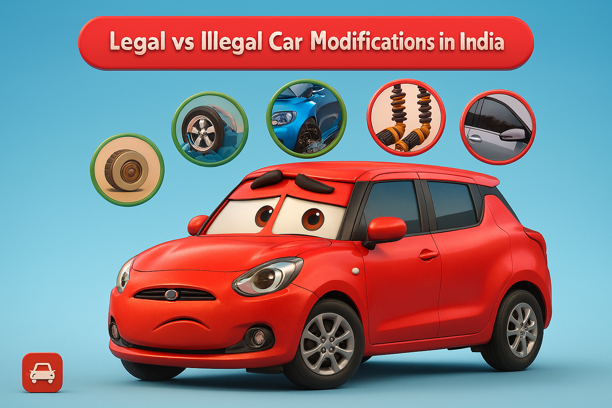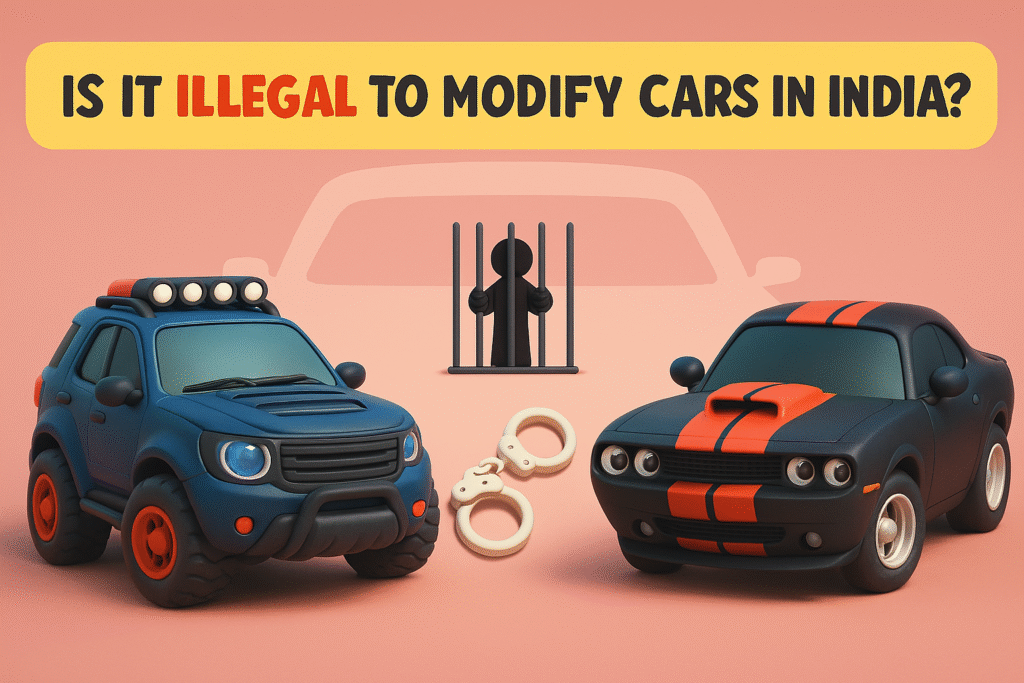
Car Modifications in India is more than just customizing your vehicle; for many, it’s a way to express individuality and enhance performance. However, in India, the law doesn’t consider every modification as legal. Knowing the difference between legal and illegal modifications is crucial to avoid fines, legal complications, or even voiding your insurance. Legal vs Illegal
Here, we’ll explore what car modifications are allowed, which ones are prohibited, and the consequences of skirting the rules. Whether you’re a first-time car owner or an enthusiast, this guide will help you understand car modification laws in India. Legal vs Illegal

Legal Car Modifications in India
The good news? Many car modifications are permissible under Indian law, provided you adhere to specific guidelines laid down by the RTO (Regional Transport Office). These allow changes that maintain safety, environmental compliance, and the vehicle’s original structure.
1. Upgrading Tires
Upgrading to high-quality tires enhances your car’s grip and handling.
- Example: A Mumbai-based owner upgraded their car’s tires within the size specifications provided in the manufacturer’s manual. This modification complied with RTO norms and improved safety during high-speed driving.
2. Approved Aftermarket Accessories
Adding features like roof racks, carriers, or bike racks is allowed if they don’t obstruct visibility or exceed load capacity.
- Example: A family in Bangalore installed an approved roof carrier to accommodate extra luggage for long trips. It complied with safety standards and didn’t alter the car’s structure.
3. Installing Certified CNG/LPG Kits
Switching to eco-friendly fuel by installing certified CNG or LPG kits is entirely legal. This not only reduces emissions but also helps save on fuel costs.
- Example: A taxi driver in Kolkata opted for an RTO-approved CNG kit installation, adhering to all safety standards and required certifications.
4. Cosmetic Modifications (Within Limits)
Mild additions such as approved spoilers, alloy wheels, and mud flaps are allowed. However, they must not alter the fundamental structure of the car.
Legal modifications can improve your car’s functionality without violating rules. Always ensure these changes are documented and approved to stay compliant.
Illegal Car Modifications in India
Certain modifications are outright illegal due to their impact on safety, public convenience, or environmental norms. Here’s a closer look at what you should avoid.
1. Altering the Vehicle Structure
Anything that changes the car’s chassis or basic structure is strictly prohibited. Removing safety features like airbags or roll cages falls under this category.
- Example: A car owner in Delhi faced legal action for removing airbags to fit a custom sound system. This compromise on safety led to hefty fines and the car’s impoundment.
2. Dark Window Tints
Applying window tints that exceed the permissible Visible Light Transmission (VLT) limit is illegal. This regulation is in place for security and visibility reasons.
- Example: A Hyderabad-based owner installed dark tints, which violated the allowed VLT, resulting in fines and the mandatory removal of the tints.
3. Modified Exhaust Systems
Exhaust systems that generate excessive noise or emissions violate noise-pollution and environmental regulations.
- Example: Young drivers in Chennai were fined for installing loud exhausts that caused noise disruption beyond the permissible level.
4. Changing Engine Specifications Without Approval
Modifications to engine performance by increasing displacement, horsepower, or altering the fuel type without RTO approval are illegal.
5. Over-Sized and Aftermarket Off-Road Tires
While upgrading tires is legal, fitting oversized tires or off-road tires that aren’t approved for regular roads compromises safety, making this illegal.
Illegal alterations can invite trouble—not just fines but also insurance claim rejections.
Consequences of Illegal Car Modifications
Car owners opting for illegal modifications risk facing various penalties. Here’s an overview of the consequences laid out by Indian regulatory authorities.
1. Hefty Fines
- Fines for illegal modifications typically range from ₹5,000 to ₹10,000. Repeat offenses can lead to harsher penalties.
- According to the RTO, over 15% of vehicles in major Indian cities have undergone illegal modifications, leading to a significant number of fines collected annually.
2. Vehicle Impoundment
Severe modifications, like altering the engine’s capacity or structural changes, may result in your vehicle being impounded.
3. Impact on Insurance
Illegal modifications can void your car insurance policy.
- Data Insight from insurancemart.co shows that vehicles with illegal modifications are 30% more likely to face insurance claim rejections due to violations of the Motor Vehicles Act.
4. Safety Hazards and Accidents
A study by the National Crime Records Bureau (NCRB) in 2021 revealed that accidents involving illegally modified vehicles rose by 20%, emphasizing the safety risks of such changes.
Why Staying Compliant Matters
Modifying your vehicle as per legal standards not only saves you from legal trouble but also ensures better safety, performance, and peace of mind.
Here’s why you should stay compliant when modifying your car:
- Protect Your Wallet: Avoid unexpected fines and higher insurance premiums.
- Boost Safety: Stay assured that your vehicle modifications won’t put anyone at risk.
- Stay Insured: Safeguard your ability to make insurance claims when you need them most.
Drive Smart with Legal Modifications
Car modification is an exciting venture, but it comes with the responsibility to follow the law. By opting for legal changes and staying within regulatory guidelines, you can enjoy the benefits of customization without any drawbacks.
If you’re unsure whether your planned modifications are legal, consult with an expert or refer to RTO guidelines. And don’t forget to explore insurancemart.co for comprehensive car insurance solutions that keep you protected against unexpected challenges.


